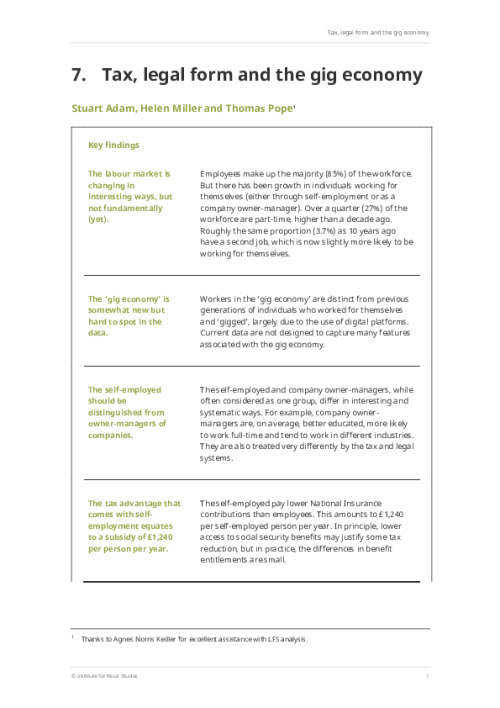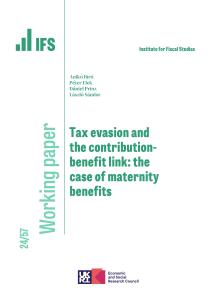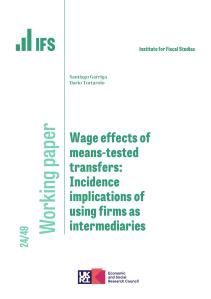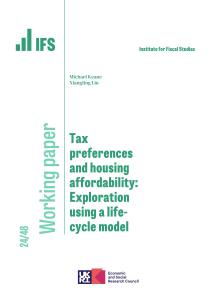This a pre-released chapter from the forthcoming IFS Green Budget 2017. The IFS Green Budget publication, produced in association with ICAEW and with funding from the Nuffield Foundation, will examine the issues and challenges facing Chancellor Philip Hammond as he prepares for his Budget in March. This will be launched at an event at 10:00 on Tuesday 7 February.
This pre-released chapter focuses on tax, legal forms and the gig economy
It has become commonplace to state that the labour market is fundamentally changing and that secure employment positions are being replaced with independent contract relationships that are more flexible but that also come with intermittent and less secure income streams and fewer rights. But to what extent is this true? This chapter sets out how the labour market is changing, discusses why the differential tax treatment of employees, the self-employed and company owner-managers is a growing problem and maps out how the treatment could be made more sensible.
Summary
The labour market is changing in interesting ways, but not fundamentally (yet).
Employees make up the majority (85%) of the workforce. But there has been growth in individuals working for themselves (either through self-employment or as a company owner-manager). Over a quarter (27%) of the workforce are part-time, higher than a decade ago. Roughly the same proportion (3.7%) as 10 years ago have a second job, which is now slightly more likely to be working for themselves.
The ‘gig economy’ is somewhat new but hard to spot in the data.
Workers in the ‘gig economy’ are distinct from previous generations of individuals who worked for themselves and ‘gigged’, largely due to the use of digital platforms. Current data are not designed to capture many features associated with the gig economy.
The self-employed should be distinguished from owner-managers of companies.
The self-employed and company owner-managers, while often considered as one group, differ in interesting and systematic ways. For example, company owner-managers are, on average, better educated, more likely to work full-time and tend to work in different industries. They are also treated very differently by the tax and legal systems.
The tax advantage that comes with self-employment equates to a subsidy of £1,240 per person per year.
The self-employed pay lower National Insurance contributions than employees. This amounts to £1,240 per self-employed person per year. In principle, lower access to social security benefits may justify some tax reduction, but in practice, the differences in benefit entitlements are small.
Company owner-managers get the most generous tax deal.
Company owner-managers can pay themselves in (more lightly taxed) dividends, and possibly capital gains, rather than just wages. Along with the self-employed, they also have more opportunities to avoid or evade taxes.
The massive tax advantages that come with working for your own business are not new and not justified.
The tax system has long encouraged people to work for their own business rather than be an employee. Lower tax rates are not justified by differences in employment rights or compliance burdens and are not well targeted at encouraging entrepreneurship.
Differing taxes based on how people work (their legal form) are unfair and inefficient.
Similar individuals can face very different tax burdens. This is unfair and creates economic inefficiency. Some people set up a business when, absent tax, they would be an employee. Much time and effort goes into policing the boundaries between legal forms.
The tax system should be reformed to align taxation of income across legal forms while not discouraging capital investment. Saving and investment should be deductible from the tax base. Each extra pound of income earned should then be taxed at the same overall rates for employees, the self-employed and company owner-managers. This would simultaneously deal with many problems that plague the tax system.












